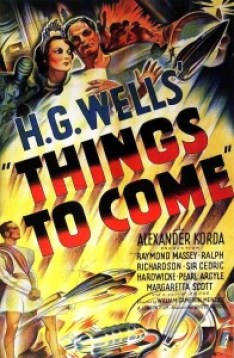
Directed by William Cameron Menzies
Expectations: Moderately high.
[There are spoilers for the ending and stuff like that in Paragraph 4 & 5. Sorry.]
Things to Come feels like the 2001: A Space Odyssey of its day. The film brings speculative fiction to life through thoughtful, imaginative ideas, instead of the ray guns and aliens that Hollywood usually likes to define science fiction by. Things to Come also doesn’t follow a traditional narrative, instead it plays almost like a dramatized history lesson of a possible future (complete with fantastic montages to cover broad gaps in time). There are characters who appear throughout the film, but I found that following their personal stories wasn’t necessary or all that interesting. They were by far the weak link, as I was much more intrigued by the broad struggles of the world presented in the film, and what the characters’ actions meant to human civilization as a whole.
Yes, Things to Come — a film made 77 years ago and less than 10 years after the introduction of sound to cinema — is such an ambitious film that it contains thoughtful social commentary; wild, imaginative fantasy; and groundbreaking production design. The fact that this isn’t the first film to do such things is a testament to our ability as humans to imagine, design and think our way around our limitations. But this also proves one of the film’s prescient thoughts, delivered to us by an elderly grandfather early in the film. He examines an “advanced” 1940s toy and scoffs, wondering if the children would be better off with the simple wooden toys of his era. Convenience and technology are nice when you’ve earned it, but they shouldn’t immediately overwrite the old ways.
But at the same time, Things to Come is a hard film to comprehend. On one hand, there’s a distinct message that wars are pointless destruction that only hold humans back from true progress. OK, sounds about right. But as the film progresses we see what society eventually grows into after the wars have stopped, and some of the citizens are still crying foul. They ask how much progress is too much, and nostalgically remember the “good ol’ days” before Earth was an idyllic and peaceful place. There’s no clear indication that these rebels are meant to be the villains, but as the film up to that point presents the scientists as the heroes, it is natural to assume this initially. They are a threat to Earth’s peace.
As this section rolled on, I began to side with the citizens, though. Their argument seemed more reasonable than the scientists’. What is the end goal of progress? It’s an endless cycle, and the grandson of the film’s “hero” (AKA the son of the kid who got that “advanced” 1940s toy) is now in charge, and has been brought up knowing only progress and technology. He can’t see the whole picture. His final monologue relates that progress must never stop, that even when we’ve conquered every planet and piece of the universe, it will only be the beginning. His family once brought liberation to the people (from a warlord who also initially rose to power by liberating the people from what ailed them), but now he’s an overzealous fascist who is oblivious to doing things for the good of the people. Like a line in one of my favorite Who songs, “Meet the new boss, same as the old boss.” So at what point do we become satisfied with technology and progress? It’s not in human nature to be completely complacent with one’s current standing, so I suppose the answer is “never.” But even if we never give up that strive for a better future, we should at least try not to drive ourselves off the cliff with a blind love of things shiny and new.
Things to Come is a landmark of classic science fiction cinema, still relevant and intriguing even now, so many years into the future. You’ll have to wade through some abrasive, hollow 1930s sound recording and some dialogue exchanges that go on far too long, but it’s definitely worth it.
